Women’s History in Montgomery County
Request one of the following Speakers Bureau topics through our online form!
Questions? Contact Matthew Gagle or call 301-340-2825.
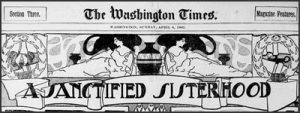 Sanctified Sisters of Colesville: The Hidden History of Commonwealth Farm Speaker: Julianne Mangin
Sanctified Sisters of Colesville: The Hidden History of Commonwealth Farm Speaker: Julianne Mangin
Learn the hidden history behind a feminist commune that ran Commonwealth Farm Inn in Colesville from 1903 to 1947. These savvy businesswomen ran an inn and restaurant that was a popular country retreat for Washingtonians. How did they end up in Montgomery County, and why was their presence forgotten? It’s a fascinating story of women determined to control their own spiritual and economic destinies.
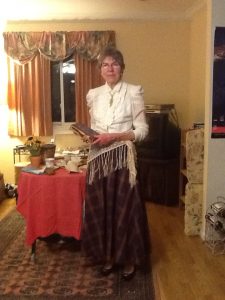 We Were There, Too: Nurses in the Civil War
We Were There, Too: Nurses in the Civil War
Reenactor: Candace Ridington
Candace Ridington portrays a nurse reminiscing about her time of service in Washington, D.C., during the Civil War when the nursing profession struggled to create itself. This reenactment portrays the nurse profession’s early challenges, its rewards and sadness, and a glimpse of other nurses whose names are known to us through their journals. Suitable for adults and young adults. 45-50 minutes.
*In-person Only*
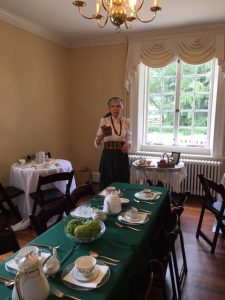 The Little Woman Who Grew Up: A Visit with Louisa May Alcott
The Little Woman Who Grew Up: A Visit with Louisa May Alcott
Reenactor: Candace Ridington
Using her own script, Candace Ridington portrays Louisa May Alcott, daughter of the controversial Bronson Alcott and author of Little Women and Hospital Sketches, abolitionist, and nurse in Washington D.C. during the Civil War. Learn about the challenges and rewards of Alcott’s life, including her family’s struggle to live at Fruitlands, a Utopian Society her father attempted to create, and her harrowing stint at the Union Hotel Hospital in Georgetown shortly after the battle of Antietam. The program lasts about 45 minutes.
*In-person Only*
 The Better Angels: Five women who changed – and were changed by – the American Civil War
The Better Angels: Five women who changed – and were changed by – the American Civil War
Speaker: Robert Plumb
A presentation in PowerPoint format about five remarkable women who made important contributions to the Union cause at various stages before, during, and after the critical years of the American Civil War. The singular actions of Clara Barton, Julia Ward Howe, Sarah Josepha Hale, Harriet Beecher Stowe, and Harriet Tubman led to their prominence during the war, and launched them into successful public roles following the conflict. Plumb will cover highlights of the women’s contributions, their legacies, and their defining qualities such as courage, self-assurance, and persistence that led to their successes. Plumb’s newest book, The Better Angels, was published by Potomac Books, an imprint of University of Nebraska Press, in March of 2020.
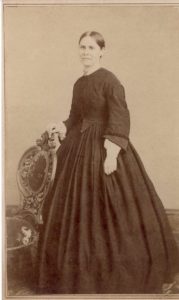 Divided Nation, Divided Town: One Woman’s Experience
Divided Nation, Divided Town: One Woman’s Experience
Speaker: Emily Correll
The story of Rockville’s Dora Higgins and her experiences during the Civil War. Based on a letter that Dora, an ardent abolitionist, wrote to her mother describing her trials as rebel general J.E.B. Stuart’s men came through Rockville and captured her husband. Dora Higgins’ experience in Civil War Rockville casts a light on the divisions apparent in even a small town in Maryland and how those divisions affected everyday dealings with neighbors.
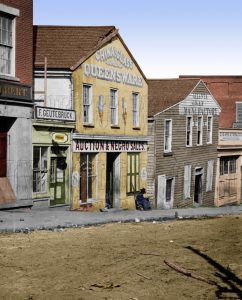 Differing Historical Perspectives on Slavery in Maryland and the District of Columbia
Differing Historical Perspectives on Slavery in Maryland and the District of Columbia
Speaker: James H. Johnston
The word “slavery” brings up a mental image of the “peculiar institution” as it existed in the Deep South right before the Civil War. Slavery in the Washington area was different. It began the same – in the late 1600s, Ninian Beall’s tobacco plantation occupied the land where the White House is today – but it soon changed. After tobacco wore out the land, slavery made less sense, and it was hard to enforce with an increasingly diverse capital of the United States. By the time of the Civil War, Washington, D.C. still had slaves, but they lived among a population of free African Americans. Author James H. Johnston will discuss the differing perspectives on slavery that emerge from his two books, The Recollections of Margaret Loughborough, about a daughter of the Old Dominion of Virginia, and From Slave Ship to Harvard, which follows six generations of an African American family in Maryland.
